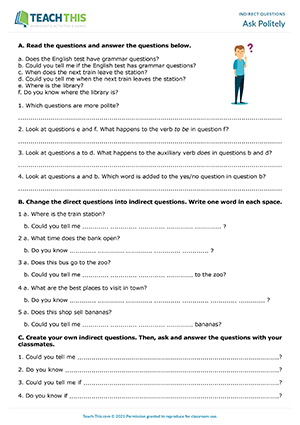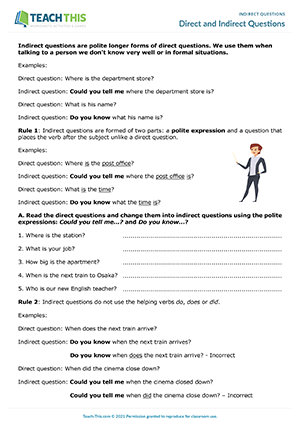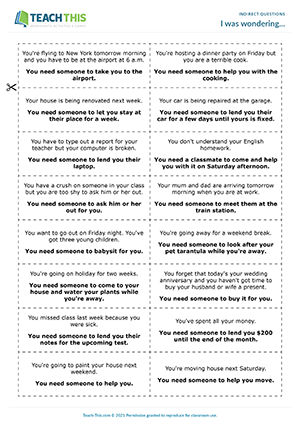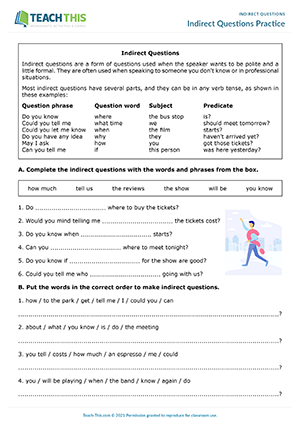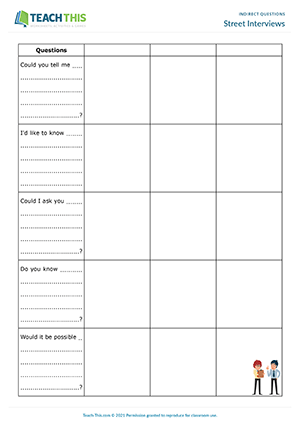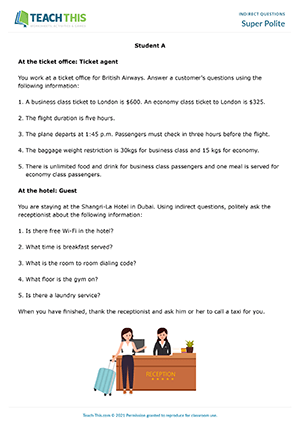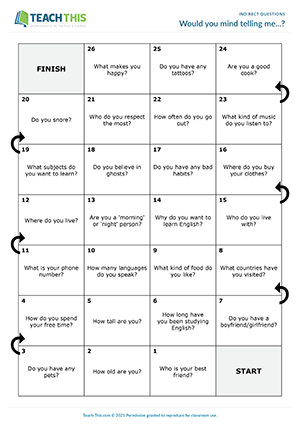Indirect Questions ESL Worksheets, Activities, Role-Plays and Games
This productive indirect questions worksheet helps students learn and practice how to form indirect questions. First, students examine three direct questions and their indirect equivalents and answer questions about how indirect questions are formed. Next, students change direct questions into indirect questions. Students then create their own indirect questions using polite phrases. Lastly, students practice asking and answering the questions with their classmates.
In this free direct and indirect questions worksheet, students learn and practice three rules for changing direct questions into indirect questions. First, students read through an introduction to indirect questions and a grammar rule for verb placement. Students then use the information to change direct questions into indirect questions using the polite expressions: Could you tell me...? and Do you know...? After that, students read the second rule that talks about how the helping verbs do, does or did are omitted from indirect questions. Next, students put words in order to form direct questions with do, does and did, which they then make into indirect questions. After that, students learn the last rule which looks at how to change direct yes/no questions into indirect ones. Students then change yes/no questions into indirect questions using a polite expression with if. Lastly, students write three indirect questions of their own and ask them to their classmates.
In this communicative indirect questions speaking activity, students use indirect question phrases to make polite requests. Students read their card and then move around the class, trying to persuade as many people as possible to do whatever is on their card. Students do this by explaining the situation and using indirect question phrases to make polite requests. Students only agree to do what other people ask if they genuinely think they wouldn't mind doing it. For example, a student should only agree to take someone to the airport at 6 a.m. if they have a car and like waking up early. If a student doesn't want to do something, they decline the request and explain why. Students note down the names of the classmates who agree to their request. Afterwards, students give feedback to the class on how many people agreed to their request.
Here is a comprehensive indirect questions worksheet to help students learn and practice how to ask questions politely. In the first exercise, students complete indirect questions with words and phrases from a box. Next, students put words in the correct order to make indirect questions. Students then correct mistakes in indirect questions. In the last exercise, students make direct questions into indirect questions.
In this engaging indirect questions speaking activity, students ask and answer indirect questions in a street interview. Students imagine that they are reporters for a local radio or TV station and that they are going to interview people on the street to find out public opinion on a chosen topic. Students choose a topic from the board and complete five indirect questions based on their chosen topic, e.g. 'Could you tell me how you feel about cryptocurrency?' Next, in two groups, reporters and passers-by, the passers-by walk around the class as if they are walking along the street. The reporters stop the passers-by and ask them if they would mind answering a few questions. The reporter then writes the person's name and interviews them, noting down their answers. When all the reporters have spoken to three people, students swap roles. Finally, students report back to the class on the answers they received.
In this free indirect questions speaking activity, students role-play two situations where someone politely asks for information using indirect questions. First, in pairs, one student plays the role of a ticket agent and the other is a customer. The two students then take part in a ticket office role-play where the customer politely asks for information about a flight to London using indirect questions. Afterwards, one student takes on the role of a hotel guest and the other takes on the role of a hotel receptionist. The pair then complete a hotel role-play where the guest uses indirect questions to politely ask for hotel information.
In this fun indirect questions board game, students change direct personal information questions into indirect questions and ask them to other students. Players take it in turns to roll the dice and move their counter along the board. When a player lands on a square, they read the direct question, change it into an indirect question, and ask the question to another student in the group, e.g. 'Would you mind telling me who your best friend is?' Students must use a different polite phrase each time to avoid repetition. The group members listen and judge the player's question. If the question is grammatically correct and avoids repetition, the player stays on the square. If the question is wrong, the player goes back two squares. The student who was asked the question then responds. The first player to reach the finish square wins the game.



